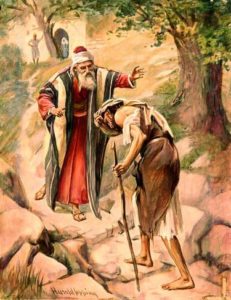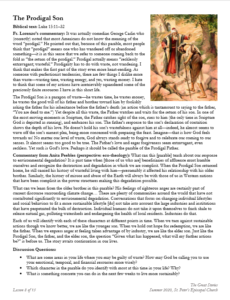
Biblical text: Luke 15:11–32
Fr. Lorenzo’s commentary: It was actually comedian George Carlin who (correctly) noted that most Americans do not know the meaning of the word “prodigal.” He pointed out that, because of this parable, most people think that “prodigal” means one who has wandered off or abandoned something—it is in this sense that we refer to someone coming back to the fold as “the return of the prodigal.” Prodigal actually means “recklessly extravagant; wasteful.” Prodigality has to do with waste, not wandering. I think that makes the first part of the story even more heart-rending. As someone with perfectionist tendencies, there are few things I dislike more than waste—wasting time, wasting energy, and yes, wasting money. I hate to think that some of my actions have irretrievably squandered some of the preciously finite resources I have in this short life.
The Prodigal Son is a paragon of waste—he wastes time, he wastes money, he wastes the good will of his father and brother toward him by foolishly asking the father for his inheritance before the father’s death (an action which is tantamount to saying to the father, “You are dead to me.”) Yet despite all this waste, the Father watches and waits for the return of his son. In one of the most moving moments in Scripture, the Father catches sight of the son, runs to him (the only time in Scripture God is depicted as running), and embraces his son. The father’s response to the son’s declaration of contrition shows the depth of his love. He doesn’t hold his son’s wastefulness against him at all—indeed, he almost seems to wave off the son’s earnest plea, being more concerned with preparing the feast. Imagine—that is how God feels towards us! No matter our level of waste, God always stands ready to forgive and to celebrate our coming to our senses. It almost seems too good to be true. The Father’s love and eager forgiveness seem extravagant, even reckless. Yet such is God’s love. Perhaps it should be called the parable of the Prodigal Father.
Commentary from Anita Peebles (perspective: eco-theology): What can this [parable] teach about our response to environmental degradation? It is past time when [those of us who are] beneficiaries of affluence must humble ourselves and recognize the destruction and degradation in which we are complicit. When the Prodigal Son returned home, he still carried his history of wasteful living with him—presumably it affected his relationship with his older brother. Similarly, the history of misuse and abuse of the Earth will always be with those of us in Western nations that have been complicit in the power structures making this degradation possible.
What can we learn from the older brother in this parable? His feelings of righteous anger are certainly part of current discourse surrounding climate change… There are plenty of communities around the world that have not contributed significantly to environmental degradation. Conversations that focus on changing individual lifestyles and social behaviors to fit a more sustainable lifestyle [do] not take into account the large industries and institutions that have perpetrated the bulk of destruction. Individual humans do not take it upon themselves to frack shale to release natural gas, polluting watersheds and endangering the health of local residents. Industries do that.
Each of us will identify with each of these characters at different points in time. When we turn against sustainable actions though we know better, we are like the younger son. When we hold out hope for redemption, we are like the father. When we express anger at feeling taken advantage of by industry, we are like the elder son. Just like the Prodigal Son, the father, and the elder son, the question “Given what has happened, what will my further actions be?” is before us. The story awaits continuation in our lives.
Discussion Questions:
- What are some areas in your life where you may be guilty of waste? How may God be calling you to use your emotional, temporal, and financial resources more wisely?
- Which character in the parable do you identify with most at this time in your life? Why?
- What is something concrete you can do in the next few weeks to live more sustainably?



Comments are closed.